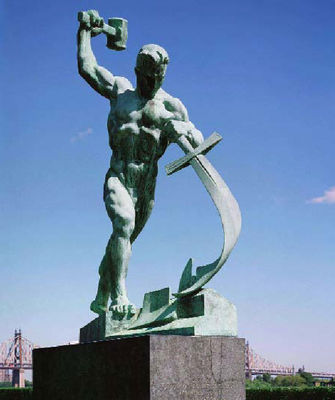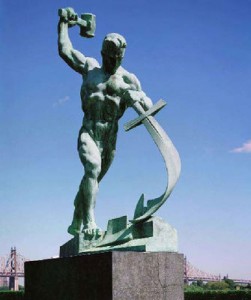Swords Into Plowshares: An Advent Reflection
See Ruth-Aimée Belonni-Rosario’s Essay, “An Advent Reflection”
See R. Ward Holder’s Essay, “An Advent Reflection”
The Word of the Lord that kicks off this Advent season in Year A of the lectionary is familiar to many. After opening the prophetic book with a chapter-long narrative of rebuke and reprimand for Judah and Jerusalem, Isaiah son of Amoz speaks further from the visions given to him by the Sovereign, the LORD of hosts, the Mighty One of Israel. In this passage, the nations stream to the mountain of the Lord. Anathea Portier-Young, writing for textweek.org, focuses on the instruction, arbitration, and training the Lord gives, perforce, to the people, so that they may learn a different way of being than their natural warmongering manner. This leads to the most well-known part of the vision: the peoples will beat their swords into plowshares, and their spears into pruning hooks, and swords will not be lifted against another, and the nations shall not learn war anymore (Isaiah 2:4).
The statue pictured at the top of this article is a rendering of this passage. It sits on the grounds of the United Nations. It was a gift to the United Nations in 1959, from the Soviet Union. As the Cold War raged, the Soviet Union gave a gift of a statue based on a passage from the Holy Bible, a text they officially saw as lacking power and authority.
Even more ironic than the gift was the year in which it was given. As this gift was bestowed, the world did not mirror Isaiah’s vision.
- Wars raged in Algeria; Kenya (the Mau Mau Rebellion); Viet Nam (where in that year the first US citizens were killed in combat); and the Belgian Congo
- An uprising in Tibet, put down by China, led to the Dalai Lama’s escape and life in exile
- Castro came to power in Cuba
- Martial law was declared in Laos
- Ceylon’s Prime Minister was assassinated
- Violence between Tutsis and Hutus began a period that came to be known as “the wind of destruction” in Rwanda
- And the first Sudanese Civil War continued, as well, through 1959. That war, which had begun in 1955, eventually led to the death of over half a million people by the end of the war in 1972. Tensions that had not been entirely addressed by war’s end would lead to the start of the Second Sudanese Civil War in the 1980’s, which would last until 2005. Both of these wars were between people in the north and people in the south, who wanted more autonomy.
Which brings us to today.
The war that had already begun to rage in Sudan when a statue called “Swords into Plowshares” was installed on the grounds of the UN and continued, either as a “hot” war or as “low-level tension” for over 50 years, may start again. A pair of referenda are making leaders in the country and across the globe nervous. Decisions on these referenda will come as the Sudanese people go to the polls come January,. The first point of decision is whether the south can secede; the second is to determine the future of the oil-rich region of Abyei. Internationally, ecumenical leaders are calling for Christians to pray with the people of Sudan for a peaceful outcome.
However, because oil and land – two of the treasures of this earth most prized and most fought over – are involved, many people are concerned about the possibility of this going smoothly. At base, the question is whether people who have studied war for half a century can start to study peace, to the point that they actually start to learn a new way to be, a new way to live, a new way to govern and to grow. (Of course, it isn’t only the Sudanese who have something to learn; China and some European countries, who have invested substantially in oil exploration and export, as well as some countries in Asia and their US investors, could afford to learn ways to make money without making war as well.)
In Isaiah’s vision, God teaches the nations how to make peace so that they beat their swords into plowshares and stop studying war. But a Google search of “War College” makes plain that the study of war is a booming business. More than a dozen institutions come up quickly; others trickle in as one scrolls down. We delve into, explore, and analyze the making of war; what we aren’t so skilled at is peace. The Rev. John Connor, Moderator of the 189th General Assembly of the United Presbyterian Church in the USA, was a peace activist and scholar. I took a class from him years ago at a summer conference on Peace Economies. A number of participants challenged Connor’s assumptions and matrices, based in part on what they knew to be true – the only way to drag a failing economy out of the dumps was to engage in war. (This “truth” was based on conventional wisdom that WWII ended the Great Depression, although many dispute the “truth” of this claim.)
Wars and rumors of wars
During this Advent season, wars and rumors of wars arise on the Korean Peninsula…and in Madagascar…and in Afghanistan…and in Iran…and in Israel/Palestine…and, finally, perhaps in Sudan as well. The list today rivals the list in 1959, when the statue entitled “Swords into Plowshares” was installed outside the UN. What hope is there for the future?
The answer lies in the same place it always has. Our hope is in the Sovereign, the LORD of hosts, the Mighty One of Israel. Human history and human life in the present show our capacity for the making of war. When we are called upon to make peace, only One can help us, as our abilities are impaired in this area.
The Presbyterian Ministry at the UN, with its ecumenical partners, calls upon US Christians to pray with and for the people of Sudan during this season. The recognition that divine help is needed is primary in the construction of wisdom. The vision from Isaiah offers us hope. In our feebleness, in our ability to view all problems as appropriate candidates for war as a sole problem-solving strategy, God offers to teach us another way. We who strive to follow Jesus are informed on our walk by the call to stand with brothers and sisters who live in harm’s way. Disagreements about Christian views of war and peace fade when we hear the request of disciples who know too well the damage of half a century of war. During this Advent, may we open our hearts and become better students of God’s instruction; may we study peace and gain the power and will to share it with others.
On Wednesday, R. Ward Holder and Ruth-Aimée Belonni-Rosario join the conversation.
See Ruth-Aimée Belonni-Rosario’s Essay, “An Advent Reflection”
See R. Ward Holder’s Essay, “An Advent Reflection”



In the patriatism and passion of WWII I was too young for the draft..my cousins, my brother, and to-be brother-in-law were (and remain) my heroes..and thankfully, all came home. Then, my first years in ministry were engaged in East Harlem where I met an intern from Germany..he described going home from school with our bombers over-head. He was the firt passivist I ever met. His credo: “IF MY LIFE IS THREATENED, I KNOW WHERE I AM GOING…I DO NOT HAVE THAT ASSURANCE FOR THE ONE THREATENING ME” Life changing for me. I am supportive now of CO ministries…two grandsons came to the age of decision and have also registered affirming that position. I am thankful that they “know where they are going”.